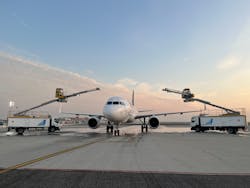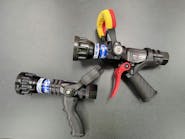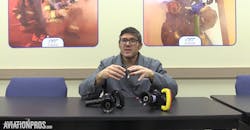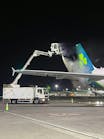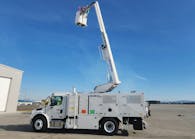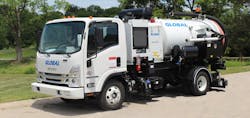Venice Airport Retrofits Vestergaard Beta Deicers with Radar Sensors for the First Time in Italy
Venice Airport has benefited from the use of the Danish produced Vestergaard Elephant BETA deicers for years. A fleet of seven Vestergaard BETAs enables a safe winter flying season with around 500-600 deicing operations per season at Marco Polo Airport. Especially the morning ice and frost situations require a high level of commitment from the team on site.
Equipped with a telescopic spray boom and a highly movable spray nozzle, the Elephant BETA deicer can reach heights of 21 m. The impressive reach of the Elephant BETA ensures effective deicing as applying the heated deicing fluid as close to the snow and ice on the aircraft as possible maximizes the effect as hardly any heat and fluid is lost when spraying.
Safety is a top priority for the operators of the million-dollar aircraft, therefore the BETAs are equipped with sensors – tusks – that immediately switch off further movement if they touch an obstacle.
The deicing tusks have been a good solution for many years, but as technology advances, aircraft materials are also changing, and the new generation aircraft are constructed with carbon composite materials. Accidental mechanical contact with these new fuselage structures requires inspection of this area and may result in flight delays.
To keep up with technological developments of aircraft and to avoid flight delays in such situations, Venice Airport decided to upgrade their trucks with a new technology Vestergaard Company has created: a new radar system, which enables contact-free safe deicing. The tusks are replaced by a radar system near the deicer spray nozzle, which initially slows down the movements of the deicer when approaching an obstacle and indicates this visually and audibly and stops it completely in minimum distance reached – with the radar system an aircraft touch is avoided completely.
Retrofitting of the first vehicles was possible for the newer generation of the BETAs and was carried out in January 2023. A Vestergaard mobile service team did the installation directly at Marco Polo Airport and the units were able to quickly resume deicing with the new technology – the first ones modified in that way in Italy.
At present numerous aircraft have already been de-iced with the radar-equipped BETAs and Andrea Florian, safety supervisor at Marco Polo Airport, is absolutely delighted with the ease of use and added safety of this option. It works reliably in any weather; be it fog or precipitation.
